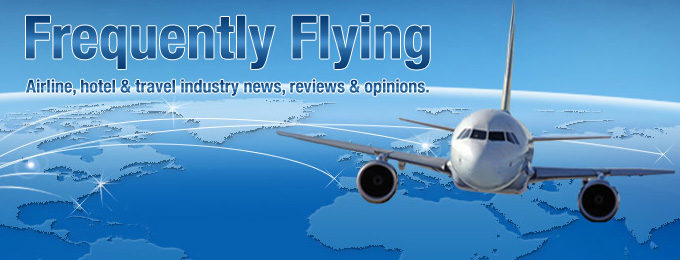More than a year ago, I posted some general information about travel waivers and now that they’re increasing in frequency with winter weather, I thought I’d expand on a couple of points.
Yesterday, United Airlines (and others) issued three separate waivers for Denver, Chicago and the Northeast. For the Denver and Chicago waivers, they isolated its terms to flights flying to, from or through the two respective airports versus expanding it to include other airports in the region that could be impacted (Colorado Springs and Milwaukee come to mind, though those flights generally feed into DEN and ORD, respectively, and are automatically covered).
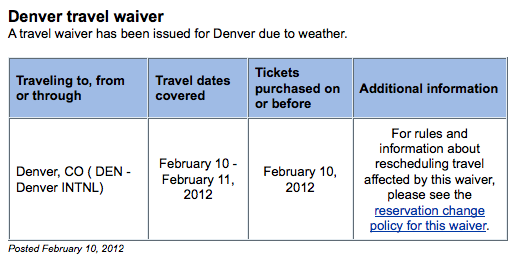
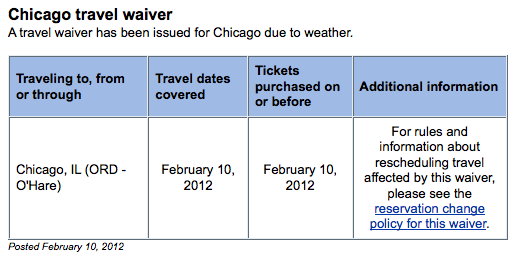 As its name implies, the Northeast waiver covers a greater spread of airports in the region.
As its name implies, the Northeast waiver covers a greater spread of airports in the region.
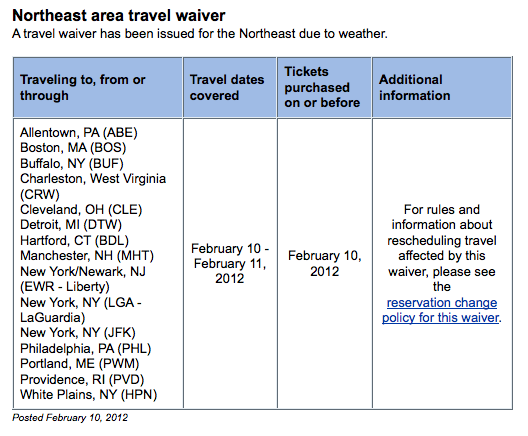 Now here’s the part many travelers don’t understand. All waivers are not created equal as the terms of one can vary significantly from another. That ends up being the case with the current batch from United. For the Denver and Chicago waivers (United internally categorized them as ‘exception level one,’ or more restrictive), the following sort-of vague terms apply.
Now here’s the part many travelers don’t understand. All waivers are not created equal as the terms of one can vary significantly from another. That ends up being the case with the current batch from United. For the Denver and Chicago waivers (United internally categorized them as ‘exception level one,’ or more restrictive), the following sort-of vague terms apply.
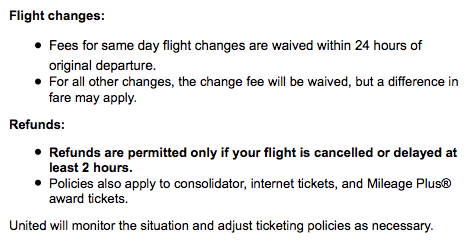 Here, the original fare bucket must be available on any flight a passenger is looking to be rebooked onto (e.g., a V-bucket to a V-bucket), though the $150 change fee will be waived. If the buckets don’t match, any applicable fare difference applies. There are always exceptions, especially if you have elite status, but that’s the way this particular waiver profile reads. Not published here is a timeframe for when revised travel must be completed, as it generally falls under the “next available flight†category.
Here, the original fare bucket must be available on any flight a passenger is looking to be rebooked onto (e.g., a V-bucket to a V-bucket), though the $150 change fee will be waived. If the buckets don’t match, any applicable fare difference applies. There are always exceptions, especially if you have elite status, but that’s the way this particular waiver profile reads. Not published here is a timeframe for when revised travel must be completed, as it generally falls under the “next available flight†category.
The Northeast waiver is less restrictive and is categorized as ‘exception level two’ (so official sounding, I know).
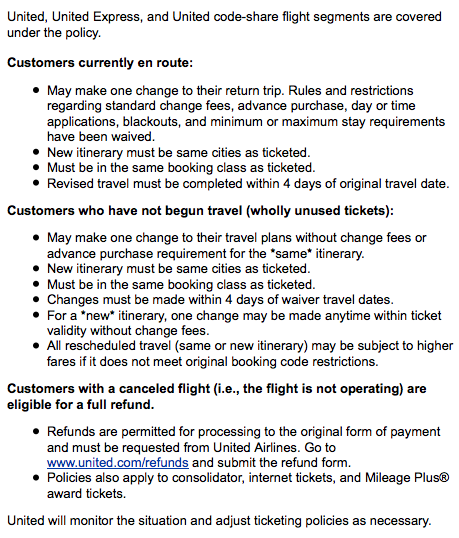 This time, United broke out the policies as to whether or not the passenger commenced travel. Both are pretty similar where change fees and other fare component rules are waived, and while it states the same booking class (fare bucket) must be available on rebooked flights, that’s not really the case for exception level two waivers. So long as there’s a seat in the same cabin as ticketed, passengers can be rebooked onto an alternate flight with availability.
This time, United broke out the policies as to whether or not the passenger commenced travel. Both are pretty similar where change fees and other fare component rules are waived, and while it states the same booking class (fare bucket) must be available on rebooked flights, that’s not really the case for exception level two waivers. So long as there’s a seat in the same cabin as ticketed, passengers can be rebooked onto an alternate flight with availability.
The power of the level two waiver, though, is this. If you’re holding an unused ticket that falls within the date parameters and you don’t want to travel, you can keep the full value of the ticket to apply to a future reservation (within 331-days of the original ticketing date). Better yet, if the flight cancels or is delayed by more than two hours, you qualify for a full refund.
As always, different agents might provide different information, so if you feel you’re getting the short end of the stick, it doesn’t hurt to politely say, “I’ll think about it and call back in a little bit,†and hang up & call back. And of course, each airline does its own thing, so be sure to check with your specific airline.
Safe travels!

